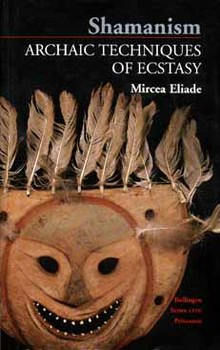
REVIEWS, EXCERPTS, & COMMENTS #
BACK COVER #
In this authoritive study, a sequel to Patterns of Comparative Religion and The Myth of the Eternal Return, M. Eliade takes up the problem of shamanism; he succeeds in defining its bounds, so that, for the first time in the history of religions, a clear idea can be formed of what shamanism is and what it is not.Thus wrote Professor M. Leenhardt (in LeMonde non chretien, Paris, 1952) of the original French edition of the present work. For the English translation of his book, Orofessor Eliade has freely revised, corrected, and augmented. The work, which is addressed to the nonspecialist reader, is the first to treat shamanism in a comprehensive way.
Shamanism is pre-eminently a religious phenomenon of Siberia and Central Asia; throughout this vast area, the magico-religious life of society centers on the figure of the shaman, at once magician and medicine man, healer and miracle-doer, psychopomp, priest, mystic, and poet. The same phenomena and techniques occur elsewhere in Asia, in Oceania, in the Americas, and among the ancient Indo-European peoples. Mircea Eliade, writing as a historian of religion, synthesizes the approaches of psychology, sociology, and ethnology. He analyzes the ideology of shamanism and discusses its techniques, its symbolisms, its mythologies. For Eliade shamanism is, precisely, a technique of ecstasy.
BLURBS #
"Eliade's works are never limited to a single description of facts : they always contain a keen analysis followed by a synthesis. The present book has the same qualities. It is clearly the best work on shamanism published so far."-- R.A. Stein, The Review of Religion
"Eliade writes of the shamans with that masterly combination of sympathy and detachment that he also showed in a previous, clear-headed study --Yoga:Immortality and Freedom . . . The work of this important scholar gains yearly in effect."
--Gerald Sykes, New York Times
. . . has become the standard work on the subject and justifies its claim to be the first book to study the phenomenon over a wide field and in a properly religious context.
-- Times Literary Supplement
"Eliade is the most informative guide to the modern mythologies."
-- Frank Kermode, New Statesman

